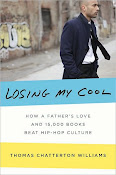 |
| "In My Mind," by ZOBEL |
By NICK CHILES
Have you ever spent time in a kindergarten classroom? The kiddies are unbelievably cute, with their bright eyes, big sloppy grins and all-around eagerness to please. But the thing that’s most striking about them is their excitement about learning. It’s like they know they are about to be handed the keys to unlock all the mysteries that swirl around them, the secrets to this vast and perplexing world that has confounded them for the first five years of their lives. If the class is diverse, you will notice that there is no gender- or race-specificity to this excitement. The white girls are just as excited as the black boys who are just as excited as the Asian boys who are just as excited as the black girls. Ask a question and most every hand shoots up to answer, each throbbing with an impatience to show the teacher—oh, the magical, beloved kindergarten teacher—how brilliant they are.
I was reminded of my forays into kindergarten land—both as a parent and as a longtime education reporter for a New York City daily newspaper—when I came across a set of statistics about black boys that were the most depressing numbers I have seen in a very long time (or at least since election night). Clearly, for black boys, some kind of poison invades their system soon after kindergarten. That kindergarten light in their eyes is snuffed like a candle. According to the National Assessment for Educational Progress (NAEP):
- Only 12 percent of black male fourth graders performed at or above proficient levels in reading. (White males at the same grade level are at 38 percent proficiency.)
- Only 9 percent of black male eighth graders perform at or above the proficient level in reading. (For white males it is 33 percent.)
- Black males score an average of 104 points lower than white males on the SAT in reading.
- In 2008, black males ages 18 and up only accounted for 5 percent of the college population, while black males make up 36 percent of the prison population.
These statistics are so scary that they should be accompanied by a horror-movie soundtrack—the screeching violins that tell you Jason or Freddy Kruger is about to devour some comely blonde. These numbers point to a community whose very future is in peril, to an entire nature whose decline is spelled out with every unimaginable percentage. Less than one of every 10 eighth graders is a proficient reader? Really? If we don’t reverse this trend, all of our children and grandchildren will be grappling with its effects for much of this century and beyond.
If we are going to halt the American slide into second-class-country status, we all must focus on this national crisis.
As the parent of three high-achieving children, I am convinced that the solution to this catastrophe is so simple that it almost brings tears to my eyes. The solution is a book. If we can develop a love of reading in these boys in the early years of their academic development, the arc of their entire lives changes, curving away from failure and disappointment and directly to success and achievement.
A book is inoculation against many of the dangers that a boy will face as he bobs and weaves his way through adolescence. I saw it happen with my own son, now an 18-year-old college freshman and engineering major. Once he latched on to reading as a little boy, his verbal and language skills soared, carrying him through those painful middle school years and the conflicts with teachers, adolescent idiocy, regrettable peer groups, and a raft of distractions. In high school, when football became a huge priority, he learned—while so many of his peers didn’t—that without performing in the classroom, he wouldn’t even get a chance to perform on the field. It was the rock-solid foundation he got through reading that sustained him, that buttressed everything he did in the classroom and on the all-important standardized tests.
Getting a child to enjoy reading is like handing him a winning lottery ticket, over and over again, every day of his life.
But, Lord, I know it’s not easy. I have gotten that message loud and clear with all of my children. The distractions that explode around us like land mines are almost impossible to stave off. Television, cell phones, texting, the Internet, those damn video games. The video games are fascinating, thrilling, addictive, toxic. Whenever I sat down with my son and allowed him to draw me into NFL Live or one of the boxing games on his Xbox, I marveled at how life-like and exciting the games were—and I thanked the Lord that nothing like that was around when I was his age, otherwise my life might have gone in another direction. As I write this, I just realized that my 11-year-old daughter, who is downright addicted to books—so addicted that we sometimes have to remind her to put the book down for a moment when she is crossing a street or walking across a parking lot—is entering her fifth straight hour playing some street racing video game on my wife’s iPad. It’s a Sunday afternoon and she hasn’t looked at a book yet. When I asked her why she was sitting on a throw pillow as she played, she grinned sheepishly (without taking her eyes and fingers off the screen) and said that her butt had started to hurt from sitting in the same spot so long. Yes, addictive and toxic.
But we can’t give up; we can’t let the distractions win. We have to keep reminding ourselves that if we can lure that 7- or 8-year-old boy into the pages of a book, where he might discover a world as transporting and magical as the images in that video game, we have just placed him squarely on a path to adult accomplishment. We have changed his life. This is about as close to a guarantee that we parents will ever be given. Let’s not blow it. The future of an entire nation is in our hands.
* * * * *
About Our MBB Contributor: Nick Chiles, a Pulitzer Prize-winning journalist, is the author of seven books, including the New York Times bestselling tome The Blueprint: A Plan for Living Above Life's Storms co-written with gospel legend Kirk Franklin. Nick also writes for several publications including Essence, where he frequently pens stories about fatherhood and manhood.
co-written with gospel legend Kirk Franklin. Nick also writes for several publications including Essence, where he frequently pens stories about fatherhood and manhood.












A loud YES!
ReplyDeleteAs the mother of a boy I have made it my mission to make sure that my son enjoys reading. I'm sure if I had a daughter we'd do the same thing! We take weekly trips to the library where he can read and see others reading. When we are at home I make sure to read to him every night and have him 'read' to me. It has to become a norm in our households.
I love your post. My son is 4 1/2 and loves to read. He's constantly shoving books in my face. That said, I worry about the other little black boys who are never read to and who don't understand that books can set them free.
ReplyDeleteWow. I guess it's time for me to do something about that. :)
Amen! As the mother of two sons (your nephews), I can't agree more. It is very difficult balancing a boy's love of video games with books. Although my boys enjoy reading, they certainly look forward to the weekends so that they can play their fast, flashy and intoxicating video games. The thing James and I find the most challenging is finding books that peek their interests. There are just not enough books out their for black pre-teen boys!
ReplyDeleteAs a mother of a little black boy, I have made it my mission in life to pass on my love for reading to him. I read to him EVERY day. I started when he was weeks old. I've had cousins, friends, aunts, even my husband ask me why am I reading to him when he doesn't understand? Because at 6 months he started to sit completely still and listen and watch. Because at 8 months he started to smile and point at the pictures. And because now at almost a year, he will bring me a book and sit down waiting for me to read it. And he has his favorites! And no matter what I am doing, I stop and read to him. Even if I read the same story 5 million times that day.
ReplyDeleteSuperb...we have to do something about this.
ReplyDeleteIf I may add that a great way to encourage reading is for a child to become a child book reviewer. There are many websites that look for children to review books. They get to keep the books and if that child has a resume a link to where their reveiw may be found can be placed on their resume.
ReplyDeletewww.resumesforchildren.com
wow what a great post...just another reminder that we need to be INVOLVED in our children's lives constantly. As a mother of two, it's so easy to let those distractions like TV get(and keep) their attention so that I can get the dishes done or put a load of laundry in...the dishes can wait...but instilling a love of reading and learning shouldn't have to.
ReplyDelete